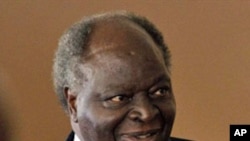Kenya’s coalition government is finally moving forward with its judicial reform agenda after President Mwai Kibaki’s surprise withdrawal of key nominations after nearly a month of controversy.
Since late January, Kenya’s coalition government has been engulfed in a bitter struggle between President Mwai Kibaki and Prime Minister Raila Odinga over controversial nominations for Kenya’s judiciary. The disagreement splintered into many different fronts, with the matter being brought before the high court in two separate cases, before parliamentary committees and before Speaker Kenneth Marende.
Marende, who initially chided both president and prime minister for their lack of unity, on Thursday ruled the nominees unconstitutional and ordered both parties to reach a consensus on the nominees.
The president and his Party of National Unity initially rejected the ruling, promising to continue the fight in Kenya’s courts.
But in a surprise move Tuesday, Kibaki, flanked by key allies in parliament, announced he would withdraw his nominations.
“Considering the importance of the Office of the Chief Justice as the head of the judicial arm of the government, it is beneficial that the nomination to fill this office during the transition period is also done through the Judicial Service Commission,” Kibaki said.
The president told reporters he would meet with Odinga to discuss the position of attorney general.
While the prime minister was attending the African Union Summit in Ethiopia, Kibaki submitted the names of Judge Alnashir Visram and lawyer Githu Muigai to parliament as replacements for Kenya’s outgoing chief justice and attorney general. The president also presented his choices for Director of Public Prosecutions and Controller of Budget. Odinga did not challenge the qualifications of the candidates, but rather his lack of involvement in the process as mandated by the constitution.
Tuesday's announcment by Kibaki is also likely to satisfy those in Kenya, including the Law Society of Kenya, who questioned the suitability of Judge Vishram to lead Kenya’s notoriously troubled judicial branch.
There were also those who had expressed concern over the lack of any public search or competitive process in selecting the Controller of Budget or Director of Public Prosecutions.
While the announcement Tuesday of the withdrawal of the nominations will certainly be seen as a victory for Odinga, he took a conciliatory line when addressing the media.
“I want to begin by paying tribute to President Mwai Kibaki for his courage in withdrawing the controversial nominations,” Odinga said.
The prime minister called the decision a victory for cooperation, but the nominations process is far from resolved. President Kibaki promised to advertise the positions of Budget Controller and Director of Public Prosecutions through the Public Service Commission, but Odinga expressed reservations about such a course of action.
“We are conscious that the current public service commission has not been reconstituted in the context of the new constitution,” he added. “As such, the interviews for the positions of the Director of Public Prosecutions and the Controller of the Budget should be conducted by competent panels of renowned experts in the concerned fields with the Public Service Commission providing secretarial services.”
Before Kenya’s judicial reform process is finally resolved, both president and prime minister will engage in what are likely to be an intense series of negotiations over the position of Attorney General. The Judicial Service Committee will also have its hands full in selecting a Chief Justice. Current Chief Justice Evan Gicheru is required by Kenya’s new constitution to vacate office by February 27, making the search for his replacement a race against time.




